Stephen Ellis Gilpin was a New Zealand singer and a founder of new wave band Mi-Sex.

Mi-Sex is a New Zealand new wave band originally active from 1978 to 1986, and led for much of its existence by Steve Gilpin as vocalist, Kevin Stanton as guitarist and songwriter, Murray Burns as keyboardist and songwriter, and Don Martin as bassist. The group's manager for much of its career was Bob Yates. Mi-Sex achieved two top 10 hit singles in 1979-80: "Computer Games" in October 1979 and "People" in 1980. Their first two albums both reached the New Zealand top 10, Graffiti Crimes and Space Race. They were known for their cutting edge production and dynamic live shows. Gilpin died in January 1992, two months after a serious car accident from which he never recovered. Mi-Sex have periodically reformed, including in 2011 with Steve Balbi (ex-Noiseworks) on lead vocals. Stanton died on 17 May 2017, Martin on 10 August 2020.
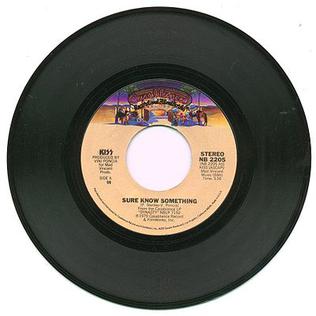
"Sure Know Something" is a single by American hard rock band Kiss, released on their 1979 album Dynasty.

"Help Is on Its Way" is a song by Australian band Little River Band, released in April 1977 as the lead single from the group's third studio album, Diamantina Cocktail. The song peaked at number one on the Australian Kent Music Report singles chart. The song also peaked at No. 14 on the Billboard Hot 100.
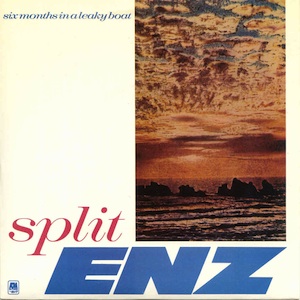
"Six Months in a Leaky Boat" is a song by New Zealand art rock group Split Enz. It was released in May 1982 as the second single from the group's eighth studio album, Time and Tide. The title is a reference to the time it took pioneers to sail to New Zealand, and a metaphor that refers to lead singer Tim Finn's nervous breakdown.

"The One Thing" is a song by Australian rock group INXS, released in July 1982 as the first single ahead of their third studio album, Shabooh Shoobah, which appeared in October that year.

"We Can Get Together" is the second single released by the Australian rock band Flowers, later known as Icehouse. It was released in September 1980, on the independent label Regular Records from their first album, Icehouse, two weeks before the album itself was released. It peaked at #16 on the Australian Kent Music Report Singles Charts.

Graffiti Crimes was the debut studio album by New Zealand new wave music group Mi-Sex, released in July 1979. The album peaked at number six on the New Zealand albums chart and number 16 on the Australian Kent Music Report. The album was certified gold in New Zealand.

"Crazy" is a song by the Australian rock/synthpop band Icehouse, from the Man of Colours album, the single peaked at Number 4 on the Australian Kent Music Report. The song was written by band members Iva Davies, Robert Kretschmer and Andy Qunta, and produced by David Lord.

"You" is a 1977 single by Australian recording artist Marcia Hines, first recorded by writer Tom Snow on his 1975 Taking It All in Stride LP. "You" was the second single from her third studio album, Ladies and Gentlemen, released in October 1977. It peaked at No. 2 in Australia, and remains Hines' highest-charting single in Australia.
"Say I Love You" is a song written by Eddy Grant in 1979. The song was first released on Grant's 1979 album Walking on Sunshine.
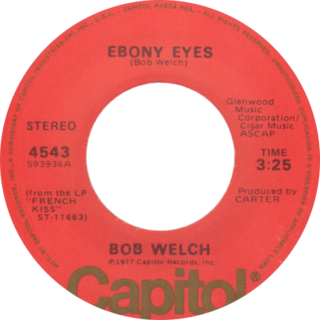
"Ebony Eyes" is a song written and performed by Bob Welch. The song was the second single release and second hit song from his album French Kiss. Backing vocals are provided by Juice Newton.
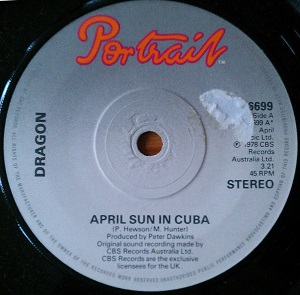
"April Sun in Cuba" is a song recorded by New Zealand group Dragon, released in October 1977. It is the first single to be released from Dragon's fourth studio album Running Free. "April Sun in Cuba" first charted on 7 November 1977, peaking at number 2 on the Kent Music Report Singles Chart and staying on the chart for 22 weeks. It also reached number 9 on the New Zealand singles chart. The b-side of the single, a non-album track called "Telephone", was credited to "Dr. Agony".
The Australian hard rock band, the Angels, have released thirteen studio albums, four live albums, eight extended plays and forty-five singles. The Angels were formed in Adelaide in 1974 by the Brewster brothers, John and Rick, together with Bernard "Doc" Neeson. The line-up of the band has since gone through numerous changes with Rick as the mainstay member. They are known as Angel City internationally
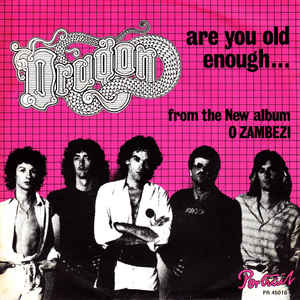
"Are You Old Enough?" is a song by New Zealand rock band Dragon, released in August 1978 while the band were still based in Australia. It was released as the first single from the group's fifth studio album O Zambezi (1978). The song peaked at number one on the Australian Kent Music Report, becoming the group's first number-one single.
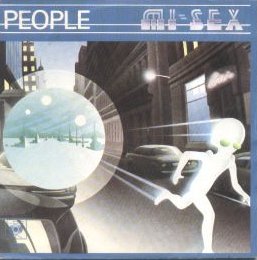
"People" is a song by New Zealand group Mi-Sex, released in March 1980 as the lead single from their second studio album, Space Race (1980). The song peaked at number 3 in New Zealand and 6 in Australia.
"But You Don't Care" is a song by New Zealand group Mi-Sex, released in June 1979 as the lead single from their debut studio album, Graffiti Crimes (1979). The song was the band's first on CBS records and became the band's first charting single, peaking at number 33 in New Zealand and 25 in Australia.
"Goosebumps" is a pop song written by Terry Britten and BA Robertson and originally released by Robertson in January 1979 as the first single from his debut album Initial Success. The single flopped, but later that year, Australian pop singer Christie Allen covered the song, which peaked at number 3 on Kent Music Report in Australia and sold over 60,000 copies
"He's My Number One" is a pop song written by Terry Britten and B. A. Robertson and recorded by Australian pop singer Christie Allen. The song was released in January 1980 as the fourth single from Allen's debut studio album, Magic Rhythm (1979). The song peaked at number 4 on the Kent Music Report in Australia.

"She's the One" is a song by Australian pub rock band the Cockroaches. It was released in January 1987 as the second single from the band's self-titled debut studio album. The song peaked at number seven in the Australian Kent Music Report singles chart.














